In 2014, the Texas Center for Justice and Equity sent surveys to 1,600 women incarcerated in the Texas Department of Criminal Justice (TDCJ). Over 430 women completed the survey, which included questions about prior victimization, substance abuse, poverty, motherhood, and more. This likely constitutes the largest-ever survey of women incarcerated in Texas, and the results are illuminating.
Highlights from the Texas Criminal Justice Coalition’s Survey of Incarcerated Women
- 52% reported that their total household income, before taxes, immediately before entering TDCJ was less than $10,000 per year.
- 55% reported having been diagnosed with a mental illness.
- 58% reported having been sexually abused or assaulted as a child. 68% of these women were first abused when they were 10 years old or younger, with 31% being abused for the first time when they were 5 years old or younger.
- 82% reported having experienced domestic violence or dating abuse.
- 25% reported having been forced to exchange sex for money, food, or basic needs before entering TDCJ.
- 12% reported having spent time in the foster care system.
- 81% reported having children.
We partnered with Dr. Andrea Button of Midwestern State University to analyze the survey responses and identify themes among those responses. The most common pre-incarceration themes show that life for many of these women included poverty, substance abuse, domestic violence, and sexual assault – all drivers into incarceration.
General Demographics
Nearly all women (95%) who completed the survey responded from a prison facility, while 3% were in a Substance Abuse Felony Punishment facility and 2% were in a state jail facility.
The racial breakdown of respondents is as follows: 49% white, non-Hispanic; 22% Black; 20% Hispanic; 3% Native American; and 6% other.
The majority of respondents were between 35 and 50 years old. 13% were younger than 35 years old and 30% were older than 50 years old.
Education
65% of women had not graduated from high school or obtained a GED, with 35% completing less than 12th grade before entering TDCJ, and 11% not completing higher than 8th grade.
Housing
Immediately before entering TDCJ, 5% of women reported being homeless and living on the street, while 35% were living with family or friends, 36% were renting an apartment or house, and 22% were homeowners.
12% of women reported having spent time in the foster care system at some point.
Employment and Income
Immediately before entering TDCJ, 47% of women were unemployed. 8% of women had non-legal employment, and 16% were employed on a part-time basis. Only 29% of women were employed full time immediately prior to entering TDCJ.
52% of women reported that their total household income, before taxes, immediately before entering TDCJ was less than $10,000 per year. 80% reported it was less than $30,000 per year. Only 10% of women reported $50,000 or more per year.
Mental Health
55% of women reported that they had been diagnosed with a mental illness. The most common diagnoses for these women were depression (69%), bipolar disorder (48%), anxiety disorder (37%), and Post-Traumatic Stress Disorder (PTSD) (32%).
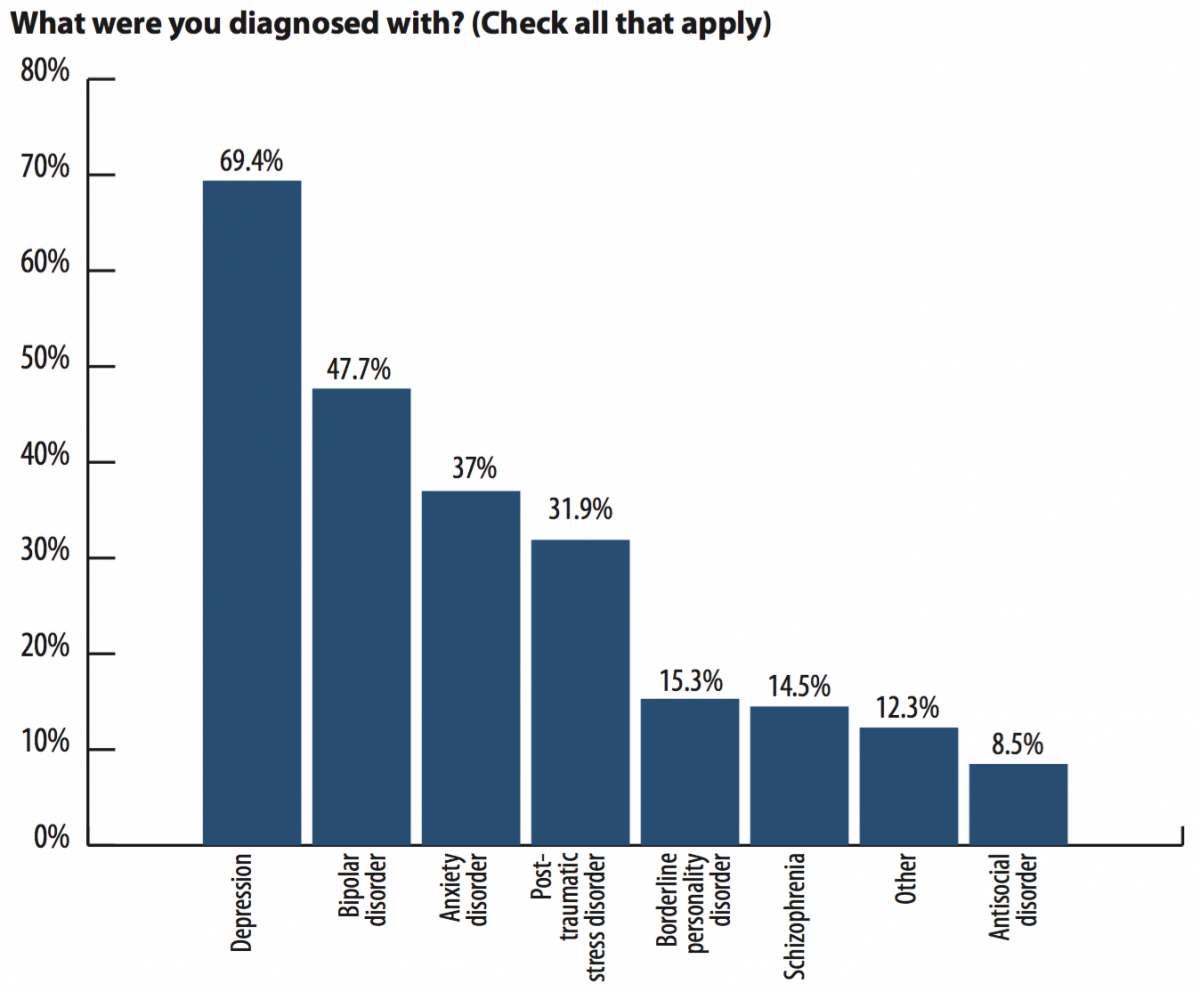
57% of women reported taking medication for mental health prescribed by a doctor while incarcerated in TDCJ, and 52% of women reported currently receiving medication for mental and/or physical health.
Drug or Alcohol Use
91% of women reported having used alcohol or drugs at some point in their lives – with 37% using alcohol and 25% using drugs for the first time when they were younger than 14.
Per the chart below, women were most likely to use alcohol, marijuana, and cocaine at some previous point.
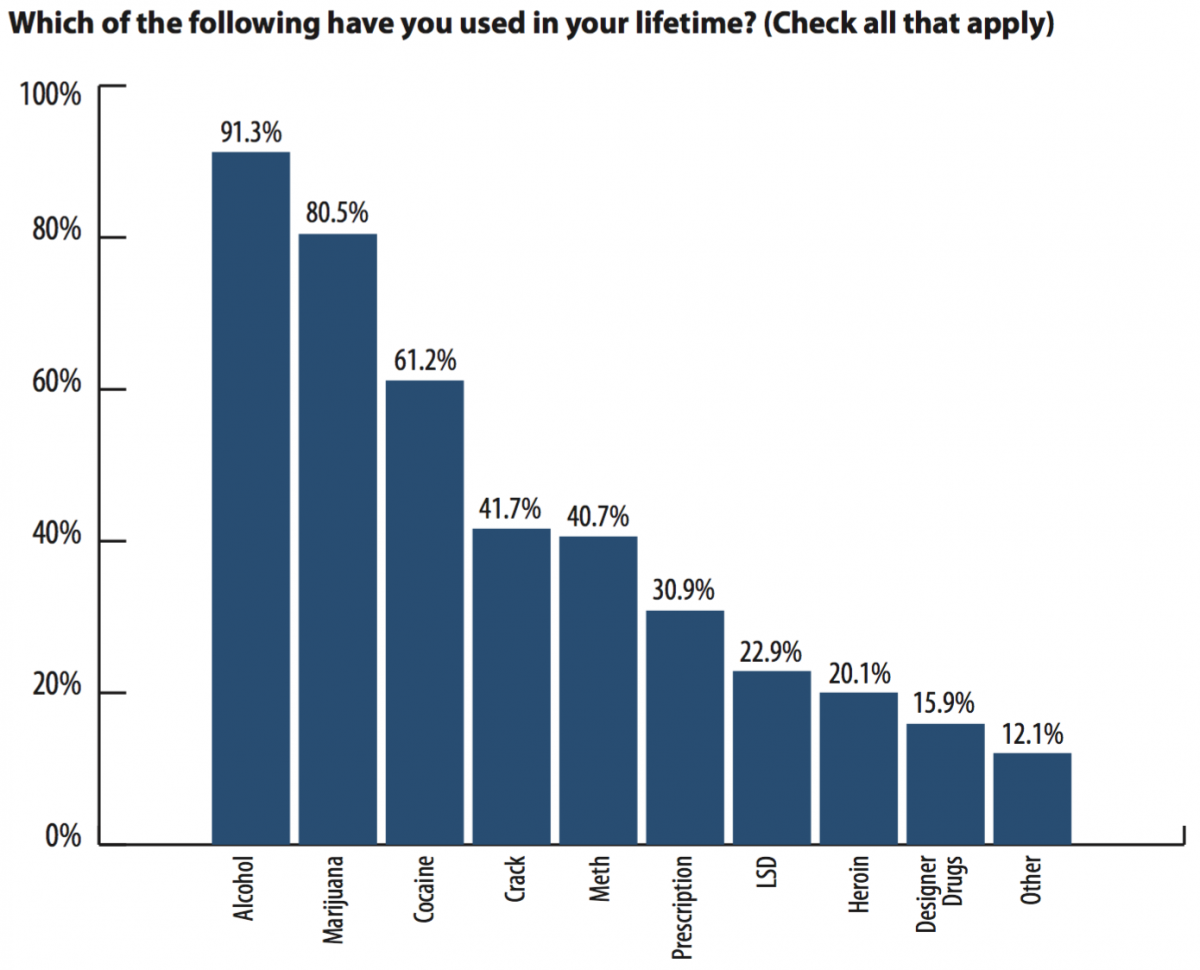
When asked about their main drug of choice before entering TDCJ, the most common response was alcohol (33%), followed by meth (15%) and marijuana (14%).
53% of women said they had never received substance abuse treatment before entering TDCJ. Only 21% reported receiving substance abuse treatment inside TDCJ (not including attending Alcoholics Anonymous or Narcotics Anonymous groups).
When asked about family histories with drug and alcohol abuse, 50% of women reported that their father abused alcohol and 33% reported their mother abused alcohol. Half of women reported that their brother(s) abused alcohol and 42% reported that their sister(s) abused alcohol.
20% of women reported that their mother abused drugs, and 20% reported that their father abused drugs. 45% of women reported that their brother(s) abused drugs and 37% reported their sister(s) abused drugs.
When asked if anyone had every forced them to use drugs, 20% of women reported that their spouse or romantic partner had done so. 10% of women reported that a family member had forced them to use drugs, and 2.5% reported being forced to use drugs by a pimp.
Sexual Abuse
58% of women reported being sexually abused or assaulted as a child. Of those women, 83% reported being abused or assaulted by a family member, compared to 32% reporting abuse by a stranger. 68% of women who were sexually abused or assaulted as children were first abused when they were 10 years old or younger, with 31% being abused for the first time when they were 5 years old or younger.
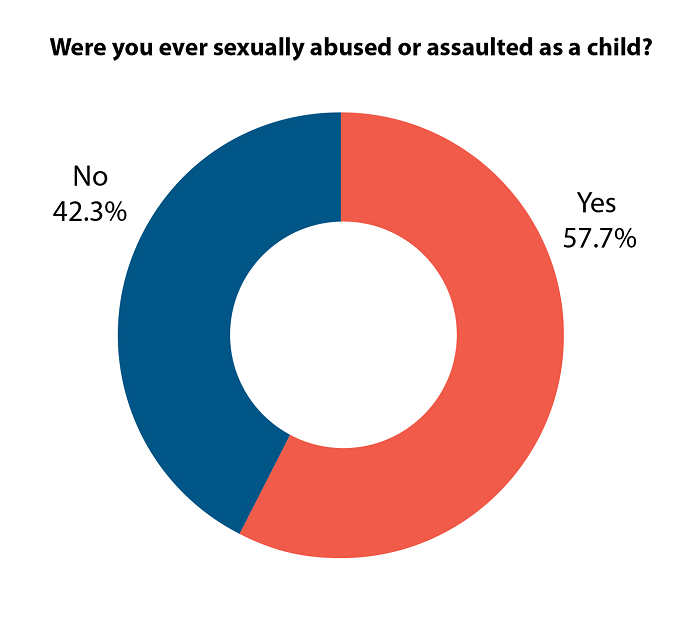
Only 24% of women responded that their sexual abuse or assault was reported to police or a child protection agency. 47% of women said the abuse or assault was not reported because the abuser was a family member or friend. 34% said the abuse or assault was not reported because they were afraid of their abuser.
47% of women reported being sexually abused or assaulted as an adult before entering TDCJ. Of those women, 50% were sexually abused or assaulted by their spouse or romantic partner, followed by 48% by a stranger. Only 27% of women reported that their sexual abuse or assault was reported to police. 50% of women said the abuse or assault was not reported because they were afraid of their abuser. 21% said the abuse or assault was not reported because the abuser was a family member or friend.
4% of women reported being sexually abused or assaulted since entering TDCJ. Of those women, 78% reported being abused or assaulted by another inmate, compared to 17% reporting being abused or assaulted by a correctional officer. 58% of these women reported that their abuse or assault was never reported to TDCJ’s Safe Prisons program or a unit official.
Physical Abuse
49% of women reported being physically abused as a child. 52% of those women were abused by their mother or father. 60% of women were less than 10 years old the first time they were physically abused. Of the women who responded that they were physically abused as children, 76% reported that their abuse was never reported to police or a child protection agency. 45% responded that the abuse was not reported because the abuser was a family member or friend, and 38% responded that the abuse was not reported because of their fear of the abuser.
62% of women reported being physically abused as an adult before entering TDCJ. 82% of those women reported being abused by their spouse or romantic partner. 44% of women responded that their abuse was reported to the police. 38% of women responded that their abuse was never reported to the police out of fear of their abuser, and 22% responded that their abuse was never reported to police because the abuser was a family member or friend.
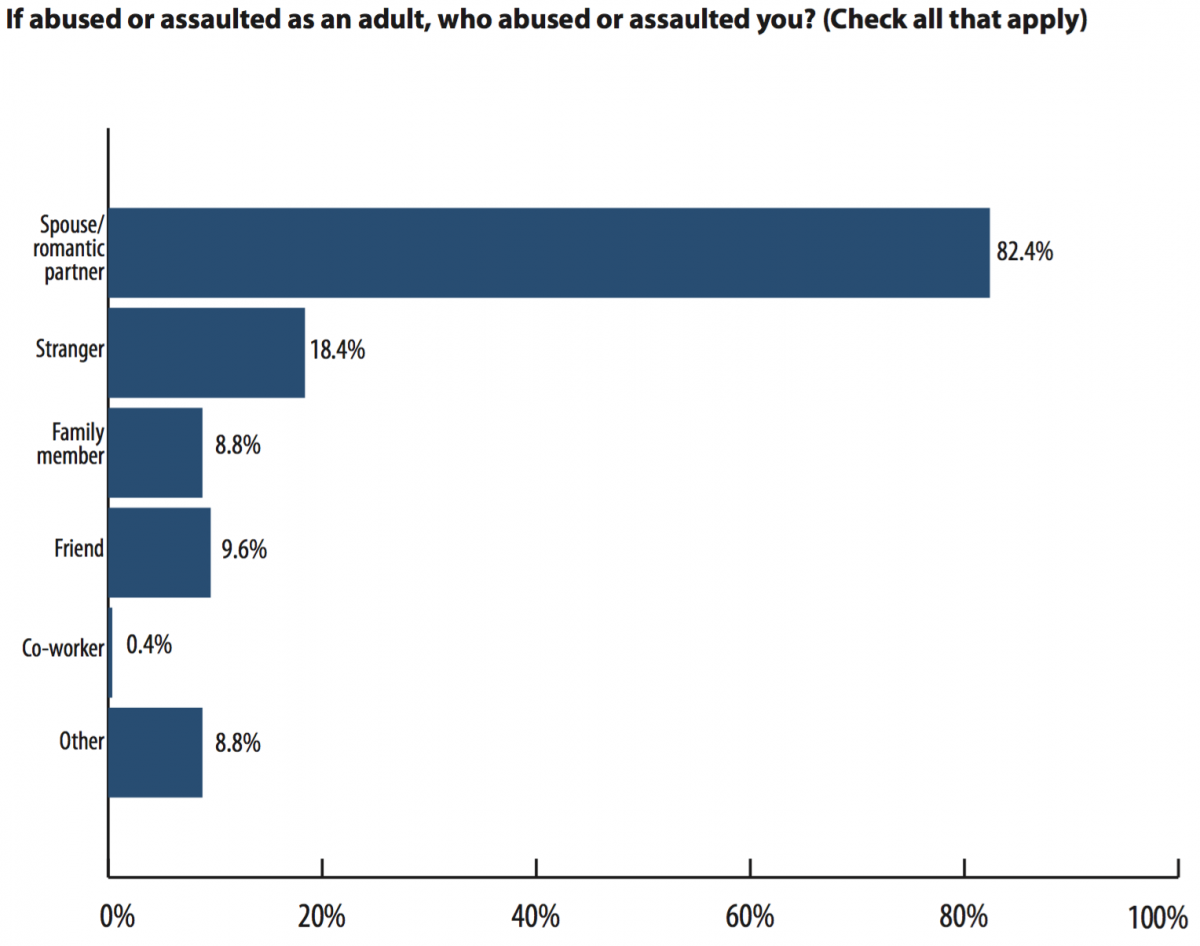
20% of women reported that they had been physically abused since entering TDCJ. Of those women, 92% responded that they had been physically abused by another inmate and 15% responded that they had been abused by a correctional officer. When asked if their physical abuse was ever reported, 81% responded that it was reported.
Domestic Violence
82% of women reported that they had experienced domestic violence or dating abuse (either physical, emotional, or sexual harm by a husband, boyfriend, girlfriend, or romantic partner).
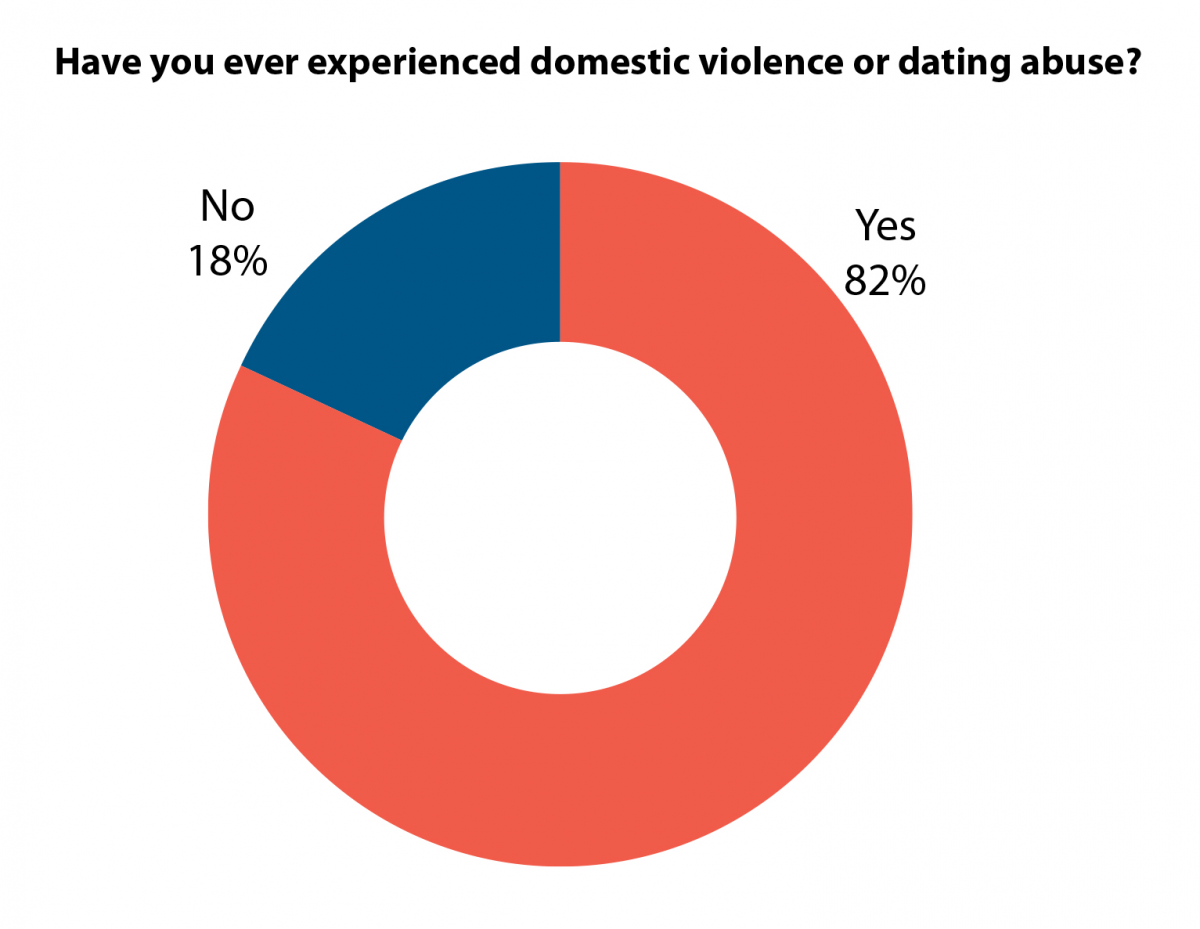
48% of women reported that they, as a child, had witnessed their mother being abused by her romantic partner. Of those women who had witnessed this abuse, 47% were 5 years old or younger the first time they witnessed it.
When asked if they believed the crime they were charged with or convicted of was related to any abuse or violence they had experienced, 48% of women responded that they did believe their crime or conviction was related to the abuse they had experienced.
Trafficking
When asked if they were ever forced to exchange sex for money, food, or basic needs before entering TDCJ, more than 25% of women responded that they had.
Pretrial & Counsel
Only 24% of women reported being released on bail or bond before their trial, while the remaining 76% of women reported being held in jail until their trial. The vast majority (73%) of women reported being represented by a court-appointed attorney.
